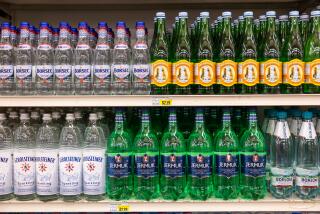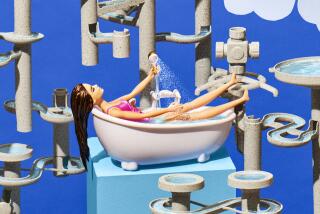Today’s Water Is Getting All Juiced Up
- Share via
Carrying that water bottle everywhere? Good for you. But are you ready for the next trend in “healthy” waters?
Look for so-called nutraceutical waters to pop up on store shelves this fall, with promotions and labels that tout them as more healthful than plain old bottled water. Instead of the usual hype surrounding the origins of the water itself, these products are about what’s been added to them--all sorts of vitamins, herbs, minerals and other nutritional supplements.
The manufacturers of this new crop of waters are promising health benefits from the added ingredients, from increasing your energy to helping relieve symptoms of PMS. Be advised, however, that some of these health claims are not yet scientifically proven.
That’s a different story from other food products in the nutraceutical category--for example, products such as Benecol and Quaker Oats, which have been shown to lower cholesterol. These products’ claims had to be scientifically proved before they could be used on labels or in advertising; not so with the implied claims that you’ll find on these new waters, which use words such as “relax,” “smart” or “skinny.”
Some may look like water, have the word “water” in their names, and maybe even taste like water. But the Food and Drug Administration has determined that these products should be regulated as food, not bottled water.
The distinction is important, says Shellee Anderson, an interdisciplinary scientist for the FDA, who notes that many of these products do not have to meet the agency’s bottled water restrictions or labeling requirements, which are designed to ensure safety and truthfulness of claims.
The new water drinks will fall under the FDA’s guidelines for general foods, similar to the nutritional supplements found in health food stores or potato chips that are sprinkled with St. John’s wort.
The water drinks, of course, are intended to appeal to health-conscious consumers who are interested in alternative treatments and mindful of the recommendation from medical experts that we should be drinking eight glasses of water a day for good health.
So until government labeling regulations catch up, beverage manufacturers will capitalize on this latest health trend by making many claims about these new water drinks. If you don’t read the labels carefully, you may overpay and be disappointed. While considering your purchase, read the labels to see what additional nutrients, minerals or vitamins have been added to the water, and why. See if the manufacturer backs up a claim by citing a scientific study.
One claim you are likely to see on labels is that vitamins pre-dissolved in water work more efficiently in your system and deliver a better health benefit. One product, Glaceau’s Vitaminworks, makes such a claim. But some experts have their doubts.
Joe Spence, director of the U.S. Department of Agriculture’s Human Nutrition Center in Beltsville Md., says vitamins are as freely absorbed by our bodies whether taken in pill form or dissolved in water.
Many of these water drinks contain various combinations of herbs. Healthy California plans to market four drinks with the names Multi, Femme, Relax and Revive. The Multi drink, which, according to the label, “prepares you for the challenges of the day,” includes the herbs echinacea, gingko, goldenseal and green tea.
Depending on the source and quantity of the herbs, these drinks may or may not have any positive effects. Read the labels carefully to be sure you know what ingredients you are consuming, and take precautions to avoid potential side effects or adverse reactions with prescription medications, supplements or other foods. If you have any questions, check with your doctor or pharmacist.
Some of the new beverages are intended to appeal to fitness buffs. Among these are Gatorade’s Propel--the Fitness Water, Glaceau’s Smartwater and Peace Mountain’s Skinny Water. Glaceau claims that its Smartwater drink increases energy levels, improves hydration and enhances detoxification. Glaceau does not claim that Smartwater--despite its name--will help answer the tougher questions on “Who Wants to Be a Millionaire.”
A 20-ounce bottle of plain water these days costs about a buck. Some of the new nutraceutical waters will be priced comparably; others will cost about twice as much as plain bottled water.
The bottom line: It may be cheaper to take your vitamins or supplements in pill form and wash them down with plain bottled water. Soothing label designs, motivating messages and health claims that sound too good to be true sometimes are.
*
Phil Lempert hosts a national syndicated radio show and is the food correspondent for NBC’s “Today” show. He can be reached by e-mail at PLempert@aol.com. His column appears the first and third Mondays of the month.






